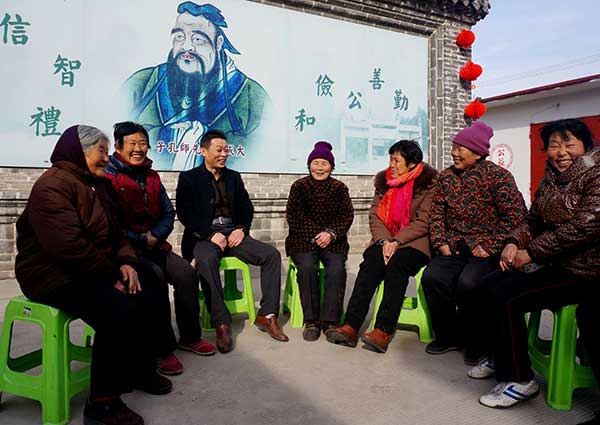TCM ethos employed to cure countryside ills
 |
|
Yang Hong (third from left), head of Shuyuan village, presides over a meeting with leading members of the mutual-help group.[Photo provided to China Daily] |
Filling the void
Global Village helps to create grassroots organizations to fill the void between the village government and local people. Liao's design for LoHo villages is built on two pillars: huzhuhui, or mutual-help groups, and joint meetings.
"The huzhuhui are based on natural villages or groups, with all the members directly elected from the same team. The leading members of the huzhuhui then form a joint meeting with village officials and social workers from Global Village," she said. "Under this system, village management is no longer a barely populated layer of governance that sometimes floats above the masses. Instead, it becomes a cohesive part of an active and vital mechanism that enables governance and self-governance at the same time."
In addition, the arrangement makes it possible for residents to assess the officials' work, and also allows a partial delegation of power from officials to mutual-help groups.
Yang Hong, head of Shuyuan, a village in Qufu that has adopted the LoHo system, said the system has saved him from being the "ever-blamable guy with an impossible task".
"Conflicts between individuals and families in the rural areas are often extremely difficult to resolve because they are complicated by a tangle of factors, historical and conventional. Before, I was supposed to mediate and, when it was absolutely unavoidable, make judgments. You can imagine the pressure," he said, citing an occasion when an angry throng of people remained in his house during a heavy rainstorm and argued their case.
"Now, in most cases, it's a group decision reached by voting, so the villagers accept that whatever the outcome, the decision is final," he said. "Before, even if I had reached a decision, people continued to petition me, and sometimes they even took the matter to the authorities in Beijing. That has stopped completely since the LoHo system was adopted. I guess that's because people feel justice has largely been done, irrespective of the end result."
Given the level of success, it's tempting to assume that village chiefs greet Liao with open arms wherever she goes, but sometimes that's not the case.
"Initial qualms aside, some village chiefs won't allow us in just because they resent the idea of sharing power," said Liao, recalling how one village head burst into hysterical laughter when she told him she could arrange for villagers to sweep the roads without being paid. She proposed that the monthly 350 yuan ($60) earmarked for road sweeping should be handed over to the mutual-help group, which would then generate goodwill by awarding payments to residents judged to have made worthwhile contributions to village life.
"He agreed, saying 'Let me see what you can do.' However, later when we brought the people together, he instantly pulled back," she said. "Not long after that, various excuses were given to our social workers in the village and they were shown the door."
















